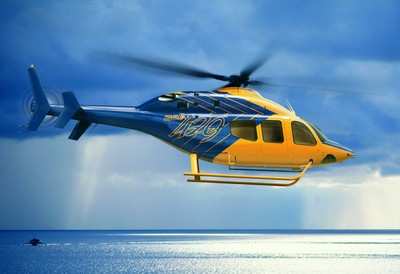Wed, Sep 08, 2010
System Approved For 9 Degree LPV Approaches At 45 knots
The FAA has certified Bell Helicopter's precision Wide Area
Augmentation System (WAAS) enabled glide path capability on the
Bell 429. The aircraft is the only helicopter available with
technology certified for 9 degree localizer precision with vertical
guidance (LPV) approaches at a minimum velocity for instrument
procedures (Vmini) of 45 knots. Such a low minimum velocity
allows for the Bell 429 to fly LPV procedures in steep approach
conditions.

Using a modernized cockpit layout and navigation solutions the
Bell WAAS capability, as demonstrated on the Bell 429, increases
helicopter safety, mission efficiency and environmental
sensitivity, while reducing precision approach limitations and
associated operational costs. Many flights are grounded annually
due to poor weather conditions, the WAAS capability allows for
point-in-space approaches as low as 250 foot visibility.
Bell's 429 WAAS implementation changes the helicopter operating
environment, allowing for the creation of a safer rotorcraft IFR
system, providing a platform to put those capabilities to use and
allowing for precision approaches in low altitude, urban areas.
Designed, developed, implemented and tested by a government
industry partnership, the continuing airspace infrastructure
project will facilitate the creation of public use rotorcraft
solutions and provide a solid framework for additional next
generation national airspace developments. Along with Bell, the
team includes the Federal Aviation FAA's Global Navigation
Satellite System (GNSS) Program Office, the FAA Flight Standards
Organization, Hickok and Associates, Air Methods Corporation, and
the Mercy Medical Team.

"It is because of this collaboration we are able to provide the
helicopter industry and our customers with innovative solutions
that exceed their mission requirements," said Nick Lappos, Bell
Helicopter chief technology officer. "It is only fitting that this
capability be available exclusively on the world's most advanced
light twin helicopter, the 429."
This technology is available immediately on all new Bell 429s
delivered out of the Bell Helicopter Mirabel, Canada facility. Bell
Helicopter is exploring the use of this technology on additional
Bell aircraft. "WAAS technologies, when combined with the 429,
provide all operators engaged in IFR operations a vehicle to
complete missions that were unthinkable in the past. This total
aircraft solution will increase the number of missions that are
flown and ultimately save more lives," said Roberts.
More News
Pilot Applied Full Aft Stick And Nose-Up Trim, But The Airplane Remained On The Runway Analysis: The pilot reported that a preflight inspection and flight control checks revealed n>[...]
A Few Questions AND Answers To Help You Get MORE Out of ANN! 1) I forgot my password. How do I find it? 1) Easy... click here and give us your e-mail address--we'll send it to you >[...]
From 2022 (YouTube Edition): Before They’re All Gone... Humankind has been messing about in airplanes for almost 120-years. In that time, thousands of aircraft representing i>[...]
Advanced Air Mobility (AAM) A transportation system that transports people and property by air between two points in the NAS using aircraft with advanced technologies, including el>[...]
Aero Linx: MQ-1B Predator The MQ-1B Predator is an armed, multi-mission, medium-altitude, long-endurance remotely piloted aircraft that is employed primarily as an intelligence-col>[...]
 NTSB Final Report: Douglas A-4K
NTSB Final Report: Douglas A-4K ANN FAQ: Q&A 101
ANN FAQ: Q&A 101 Classic Aero-TV: PBY Catalina--From Wartime to Double Sunrise to the Long Sunset
Classic Aero-TV: PBY Catalina--From Wartime to Double Sunrise to the Long Sunset ANN's Daily Aero-Term (07.01.25): Advanced Air Mobility (AAM)
ANN's Daily Aero-Term (07.01.25): Advanced Air Mobility (AAM) ANN's Daily Aero-Linx (07.01.25)
ANN's Daily Aero-Linx (07.01.25)




